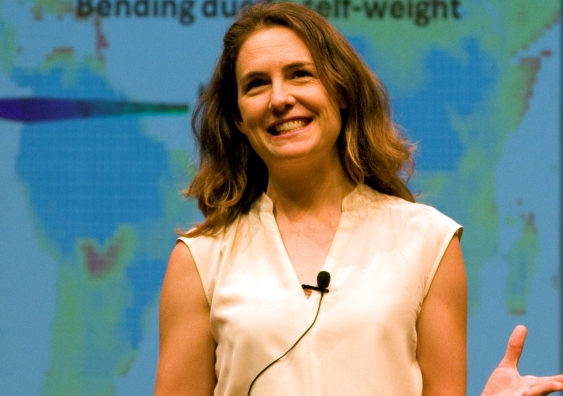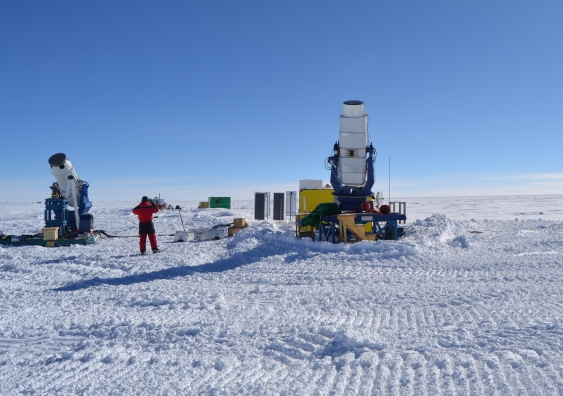Three-minute thesis can take you to the stars
Winning the UNSW Three-Minute Thesis title propelled UNSW Canberra engineering student Rosemary Barnes to astronomical heights.
Winning the UNSW Three-Minute Thesis title propelled UNSW Canberra engineering student Rosemary Barnes to astronomical heights.

Leilah Schubert
UNSW Media
02 9385 8107
l.schubert@unsw.edu.au
Winning the UNSW Three-Minute Thesis title propelled UNSW Canberra engineering student Rosemary Barnes to astronomical heights.
After winning last year’s UNSW 3MT finals Barnes, who is on the cusp of completing her doctorate into low-cost wind turbine solutions, was plucked from relative obscurity to be a partner on a major observatory project in Antarctica.
Sitting in the audience at the competition was astrophysics Professor Michael Ashley, from UNSW Science’s School of Physics. He was immediately captivated.
“Rosemary is a fantastic example of how good communication skills can lift an excellent researcher to the extraordinary.”
Professor Ashley’s team is leading an Australian bid to build an infrared/optical telescope on the Antarctic plateau and collaborate with Chinese and US astronomy researchers in existing facilities on the icy continent.
In addition to astronomical instrumentation his team has provided computer control, satellite communications and power systems to keep the observatories ticking over completely unmanned, save for one to three weeks’ annual maintenance.
With the sun down continuously for more than four months mid-year, “just when we want to use our telescopes”, and a tonne of batteries lasting little more than a day or two, Professor Ashley has had to rely on diesel – an expensive and polluting option.
“There has been increasing urgency from my Chinese collaborators to replace the diesel engines with renewable energy sources if possible,” he said.
“But we had previously discounted wind power since, despite the common perception of Antarctica, the place where we are working at the top of the high plateau in the centre of Antarctica is the least windy place on Earth.”

Chinese AST3 telescopes at Dome A, Antarctica, powered by the UNSW PLATO-A observatory. Image: Fujia Du, 2015.
Inspired to examine the question anew, Professor Ashley approached Barnes after her talk to see whether she was interested in working on a special wind turbine blade design to suit the unusual Antarctic conditions.
She jumped at the opportunity.
“It sounded like a really interesting project, so I agreed to get involved,” said Barnes who has been engaged to consult on aerodynamic and structural design.
“There has been increasing urgency from my Chinese collaborators to replace the diesel engines with renewable energy sources if possible.”
“It is great to get the opportunity to apply some of my PhD research to a practical problem. I am really looking forward to seeing the turbine manufactured and installed.”
Professor Ashley has applied for an ARC Linkage grant to pay for the prototype turbine and a design for a new lower-pollution diesel engine.
It’s been a whirlwind 12 months for Barnes, who worked for several years as an engineer before returning to university armed with “a list of skills I wanted to gain, and with the hope that a PhD would take my career in more interesting directions”.
She represented UNSW at the Trans-Tasman and international Universitas 21 3MT contests, giving her research global exposure.
“Rosemary is a fantastic example of how good communication skills can lift an excellent researcher to the extraordinary,” said Pro-Vice-Chancellor (Research Training) Professor Laura Poole-Warren. “Her research is incredibly important, with climate change and energy costs being the focus of concern for so many people in the community.
“Through 3MT and subsequent media coverage she has achieved enormous impact with the wider community both within and, more importantly in outside the university sector. Rosemary is a fine exemplar of how important it is to combine good communication skills with excellent research to achieve impact.”
As she nears submission of her thesis with a degree of impatience, Barnes said she has definitely ticked off all the items on her ‘doctoral bucket list’ and is hoping to find a job that combines both research and industry engagement.
Europe is high on her wish list but she doesn’t think she’ll be able to stay away from Australia for long.
“I know I will miss the climate and the wildlife too much to stay away forever.”